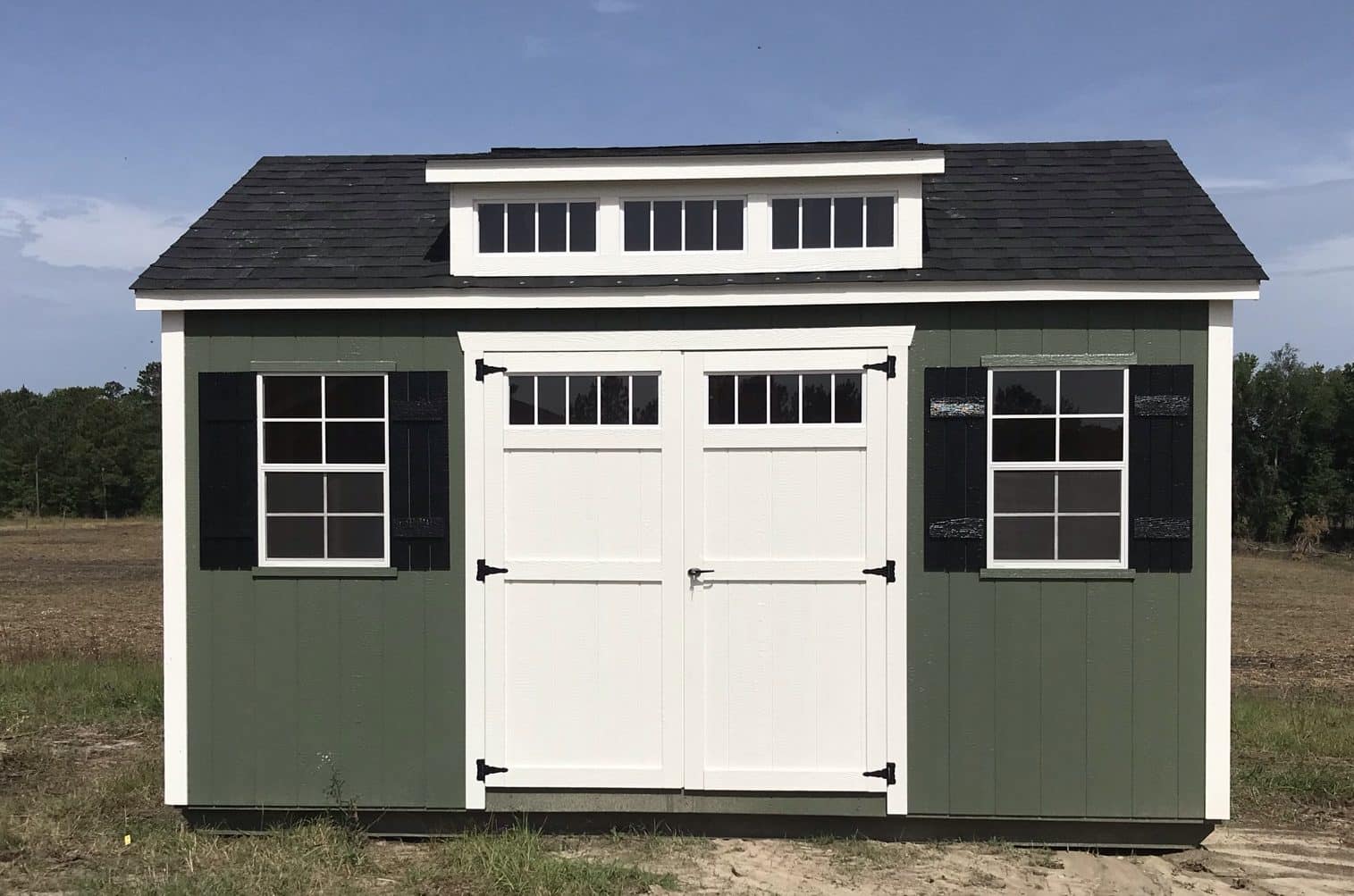
What You Need to Know About Shed Doors
Austin Weaver - November 18, 2024
☃️ Winter Deals You Can’t Miss ☃️
Inventory 3D Builder
Contents
- What is a good size for a shed door?
- What kind of wood is used for shed doors?
- How easy is it to change a shed door?
- How do I keep my shed door from sliding open?
- What kind of shed door do I need?
- Do you Install trim On A Shed door?
- What Are Some Different Types Of Shed doors?
- Should I paint my shed door?
- Shed door latches and locks
- Conclusion
What is a good size for a shed door?
The best size shed doors you can have are ones that meet the needs of why you have a shed in the first place. The standard shed door size is 6ft tall x 6.5ft wide. This allows people to easily access the shed while also allowing machinery and equipment to be stored inside as well. There are some cases where you will need more oversized shed doors. For example, if you plan to store an ATV or large lawn mower inside, you can request custom-sized doors. Or click on the link to read more about custom-built sheds.
What kind of wood is used for shed doors?
The most common wood that is used for shed doors is plywood since it is durable and long-lasting. During winter months, plywood can withstand severe weather. Plywood is lightweight and could be cut and formed to any size and design for shed doors.
How easy is it to change a shed door?
Replacing a shed door is fairly straightforward. Let’s walk through how to install a shed door. All you need are these tools:
- tape measure,
- pencil
- shed door
- hinges
- lock
First, measure the existing door opening and the door size. Make sure to plumb the door with a level because some door openings tend to get out of level over time which might give you a hassle later on.
Second, buy a shed door with the measurement that you took. If you can’t find the exact size, go up a size because doors can be trimmed or sanded down to fit perfectly.
Next, what you need to buy are hinges and locks. Pay attention to the manufacturer’s instructions for hinges, as you’ll need two or three, depending on the door’s weight (you can see the door’s weight on the hinge side). If the manufacturer recommends three, use three. As for locks, choose your lock after you’ve installed your hinges. If security isn’t a concern, a simple bolt and chain may work just fine.
Next, put the hinges on the new door and align your new hinges with the holes of the old door hinges. Mark out where they should go on the shed door with a pencil and screw these in for easier door hanging. Make sure they’re tight. Screws should have come with the door you bought.
Lastly, the shed door must be lifted and placed on the hinge. You might need someone to hold the door for this part. Screw everything in place and open and close the shed door to see if anything is stuck or jammed.
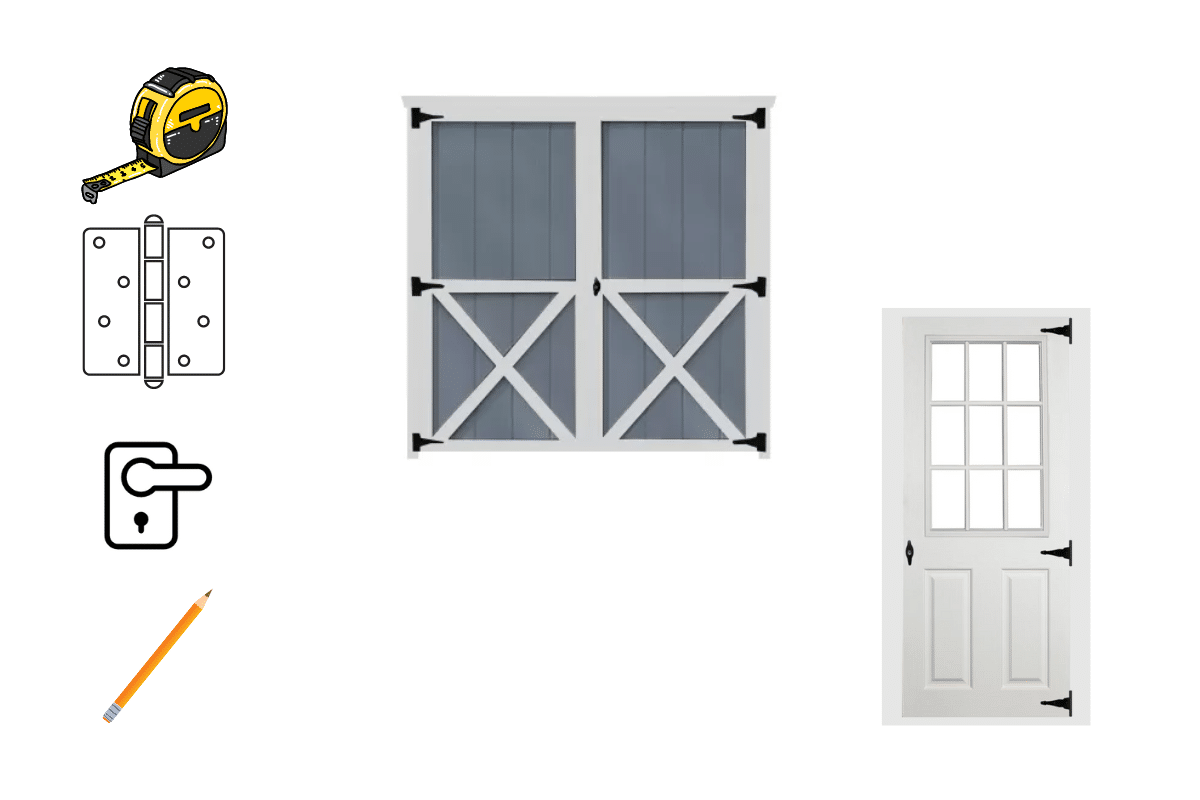
How do I keep my shed door from sliding open?
Is your sliding barn door opening slowly on its own? Or is your shed door swinging open? You’ve come to the right place if you’re looking for advice on how to keep your barn door from sliding. There is no bullet answer to it, but common problems for shed doors opening on their own are because of hinges that are not plum and door openings that are not plum. But a slight adjustment will fix your issue of your shed door opening and closing on its own. Look at the hinges or the track, make sure they are plumb, and see if the screws are tight. Because if the screws are not tight enough, it will cause the door to open on its own. Close the door and look carefully at the hinges. Once you’ve identified which hinge is not tight, screw them in tighter. With the framer’s square, check the corners of the shed door to see if the door’s square.
Making sure that everything is level and flush with your shed will help you keep the doors closed!
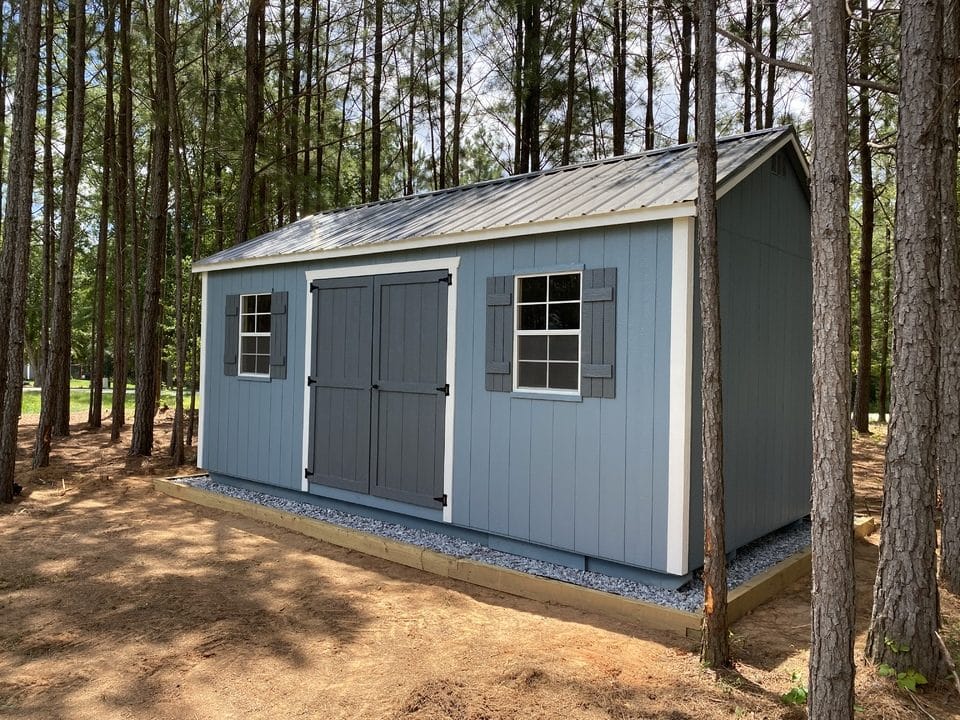
What kind of shed door do I need?
There are so many things to consider when looking for the types of shed doors to get because a lot of shed doors have different purposes and benefits. For example, a greenhouse shed will need a different type of shed door than a garage shed. Here are some shed door types and styles.
Sliding Shed Door: Sliding doors are lovely due to their efficient use of space. Removing the swing space required for a hinged door makes the space in front of the door much more helpful, especially if you need a lot of area for storage. During winter, you don’t need to shovel snow from the doorway. Sliding doors are also secure.
36” Fiberglass 9-Lite Door: Fiberglass doors are durable and long-lasting. Fiberglass doors are dent and scratch resistant and will not malfunction. You can use the door without needing to replace the door for years. When compared to wooden or steel doors, they are much more resistant to decay. Fiberglass may need to be repainted occasionally, but the door won’t appear worn.
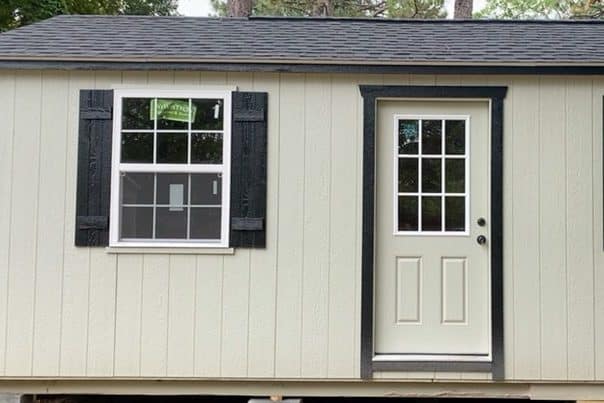
Double Shed Door: With double shed doors, you have more room to move equipment like lawnmowers, tools, gardening supplies, snow blowers, and bicycles. Double doors give you the option of having enough room while also not appearing bulky or too much., And once inside, there should be plenty of room for your stuff. Standard sheds are at least 8 feet by 10 feet in size, and if you get them with double doors, it will not be a hassle for large equipment.
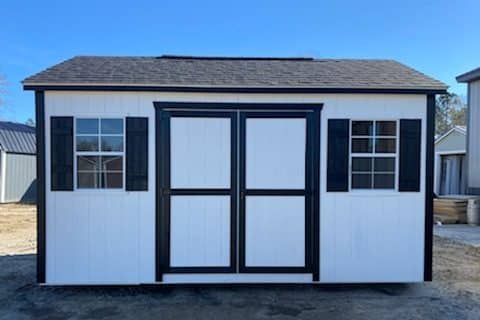
Garage Door: Overhead garage door allows you to access vehicles and oversized items. It is easier when you move a lot of equipment, such as lawnmowers, tractors, snow blowers, and bikes. In addition, the garage doors will not take up so much space when you open and close them. You will not have that issue with the garage doors on your shed. The standard garage door size is 8ft tall x 7ft wide.
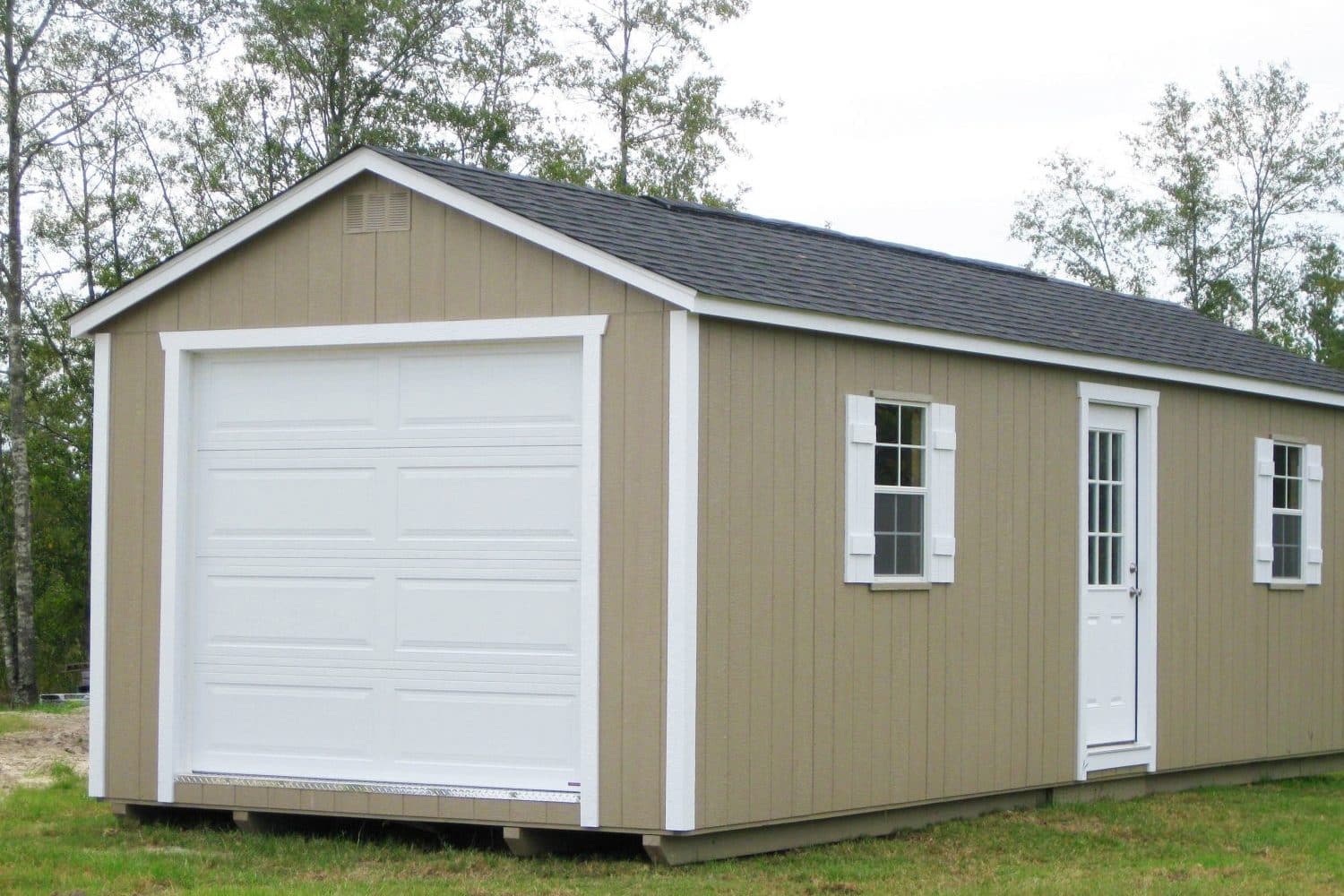
Do you Install trim On A Shed door?
Yes, installing trim on your shed door makes your shed appear more delightful. Plus, it helps cover up the gaps between the door and the wall opening. It also offers protection to your door against critters trying to get inside. There are different types of door trims that have multiple designs.
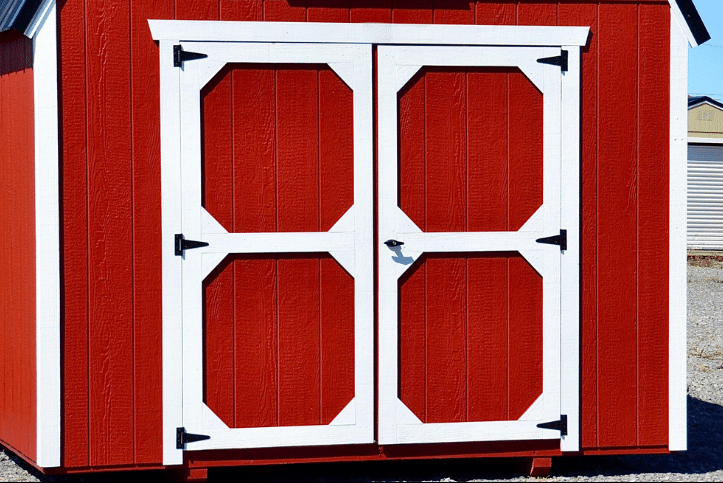
What Are Some Different Types Of Shed doors?
There are different types of shed doors; here are some of the standard shed doors that serve multiple purposes…
- Sliding shed doors: Sliding shed doors are installed by a track that acts as a hinge. The track has a roller that helps it slide back and forth. That way, you can slide the sliding shed door into or on the side of the wall, which allows you to save space.
- Double door: Double shed doors give you the option of easy access to your shed. Having a double-door shed is ideal if you’re moving heavy equipment out of your shed.
- Plain doors: There are two different types of basic doors; pre-hung and slab doors. Pre-hung doors come with a frame, a casing, and a drilled hole for a door knob. Slab doors are just plain doors by themselves that are ⅓ cheaper than pre-hung doors. Slab doors are used when replacing/remodeling doors that are damaged.
- Stable doors: Stable doors are durable and long-lasting. They are manufactured to withstand anything that comes at them. Stable doors are also great for ventilation; if you want security, you can lock the bottom of the door and open the top.
- Ledged and braced doors: Ledged and braced doors have 2X4’’ wood on the rear, which is horizontally and vertically nailed to the door as a “Z” on the back. Thus providing durability and strength to the door.
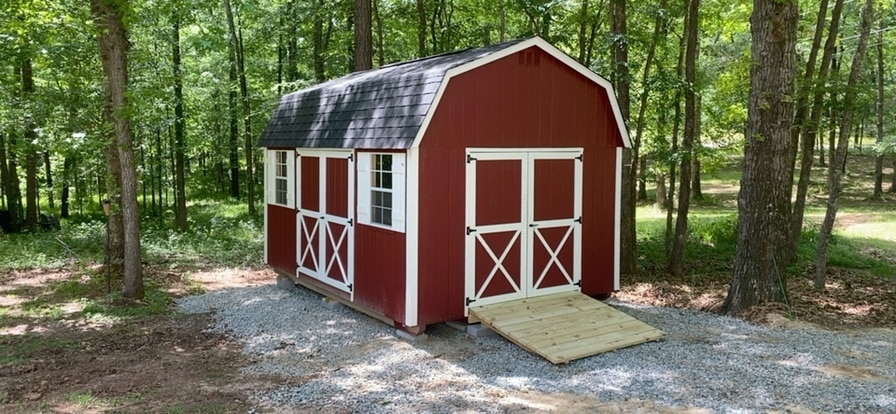
Should I paint my shed door?
If you’ve recently had a shed built and are wondering if you should bother painting the raw wood, the answer is yes. Although one of the primary reasons for painting your shed is stylistic, the paint will also protect the wood from the weather. The color you choose is up to you!
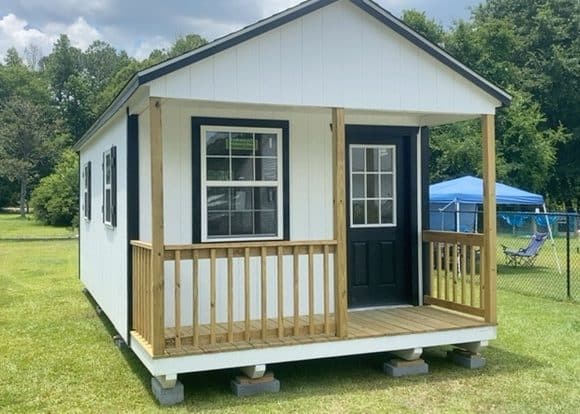
Shed door latches and locks
Shed door latches are different from locks. The latch helps hold the door closed when it gets windy or keeps the door from swinging, but it is not for securing the door. Shed door locks, however, have multiple types and are designed for security. For instance, rim locks, pad bolt, hasp and staple, and a shed door bar.
- Rim locks: The rim lock has a very appealing appearance. Most people install these locks because they look nice. They make the door appear more secure. The locks are typically installed on the outside. As a result, they are ideal for thin doors. For example, if one owns a shed, the door may be too thin to fit with a standard lock. In this case, the rim lock will secure the door. This can keep children away from some of the agrochemicals stored in such sheds.
- Pad bolt: A pad bolt gives you the option of putting a padlock on your shed door for more security. Installing a pad bolt is very easy as it takes only two steps. Measure the height you want the pad bolt to be and ensure it is level. Secondly, screw the padlock into the shed door.
- Hasp and staple: Hasp and staple locks are hinge clasps used for securing or holding gates and shed doors. Hasp and staple are similar to pad bolts, but hasp and staple are screwed in on the side of the door when pad bolts are screwed in on the front of the shed door. Hasp and Staples have a loop also for a padlock.
- Shed door bar: A shed door bar is a top-level lock for sheds. A shed door bar is a strip of metal that is about 5 ft or 6 ft installed horizontally on the side of the door with padlocks on both sides.
Conclusion
We hope all the details about shed doors have helped you to replace your shed door or install it smoothly. Enjoy! Give us a call at (478)-595-6513 or contact us with your need or questions!
